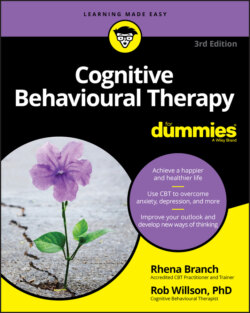Читать книгу Cognitive Behavioural Therapy For Dummies - Rob Willson - Страница 33
Mental Filtering: Keeping an Open Mind
ОглавлениеMental filtering is a bias in the way you process information, in which you acknowledge only information that fits with a belief you hold. The process is much like a filter on a camera lens that allows in only certain kinds of light. Information that doesn’t fit tends to be ignored. If you think any of the following, you’re making the ‘mental filtering’ thinking error:
You believe you’re a failure, so you tend to focus on your mistakes at work and overlook successes and achievements. At the end of the week, you often feel disappointed about your lack of achievement – but this is probably largely the result of you not paying attention to your successes.
You believe you’re unlikeable and really notice each time your friend is late to call back or seems too busy to see you. You tend to disregard the ways in which people act warmly towards you, thus sustaining your view that you’re unlikeable.
To combat mental filtering, look more closely at situations you feel down about. Deliberately collecting evidence that contradicts your negative thoughts can help you to correct your information-processing bias. Try the following:
Examine your filters closely. For example, are you sifting your achievements through an ‘I’m a failure’ filter? If so, then only failure-related information gets through. If you look for a friend’s achievements over the same week without a filter, you’re likely to find him in far greater possession of success. So drop the filter when assessing yourself in the same way you do when looking at your friends’ achievements.
Gather evidence. Imagine you’re collecting evidence for a court case to prove that your negative thought isn’t true. What evidence do you cite? Would, for example, an assertion that you’re unlikeable stand up in court against the proof of your friends behaving warmly towards you?
If you only ever take in information that fits with your negative thinking, you can very easily end up reinforcing undesirable thinking habits. The fact that you don’t see the positive stuff about yourself, or your experiences, doesn’t mean it isn’t there (just bear in mind Figure 2-9!).
© John Wiley & Sons, Inc.
FIGURE 2-9: Mental filtering.
